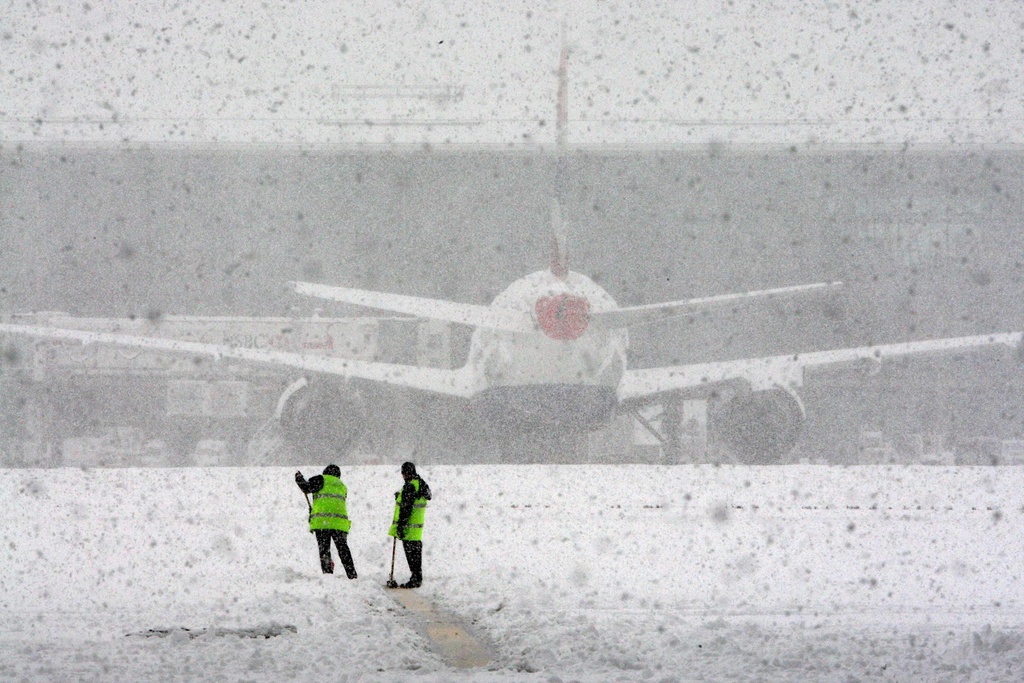Frustration grows at Zurich airport row

The long-running Zurich air traffic dispute is centre stage again as business groups and politicians appeal to the electorate ahead of a vote next month.
Business groups on both sides of the border are beginning to lose patience with the stalemate hampering the airport with “many customers and few friends”.
At the end of November in canton Zurich there will be yet another vote over the future of Zurich airport, the country’s biggest which is located at Kloten, just 20 miles from the German border.
Voters will be asked to decide on an initiative blocking the construction of new runways or extensions to runways as well as a counter proposal from the Vereins Flugschneise Süd – Nein (Flightpath South Association – No) which calls for more far-reaching restrictions.
In the lead up to the vote business groups from southern Baden (Germany) and northern Switzerland have joined together to form the Hochrhein Business Network. The groups are publicly pressuring the transport ministers from Bern and Berlin to finally find a solution to the airport row.
In the political arena, in the middle of an intense federal election campaign, 20 parliamentarians from left to right have united to form an air traffic working team to tackle the conflict with Germany over aircraft noise.
The vote that takes place one month after the October 23 Swiss parliamentary elections is formally limited to the canton but is clearly of national significance. For the third time in four years, voters from the region will decide about the future role of the airport as transport infrastructure.
No-fly zone
The Swiss problem stems from Germany’s move in 2003 to unilaterally restrict the number of flights over its territory and enforce a total ban on night landings and take offs.
The planes banned from German airspace are forced to fly instead over the densely populated areas south and east of Zurich, creating a political hot potato to the Swiss communities and cantons.
“If the [November] vote turns out negative for the airport, this would strengthen the position of the southern German communities,” said Andreas Wittmer, director of the Center for Aviation Competence, an aviation institute at St Gallen University.
The development potential of this intercontinental gateway to the world is suffering the combined effects of the cross-border and local rows. “Let’s be honest, our current prosperity would not be possible without this airport,” Wittmer told swissinfo.ch.
Status quo
The northern Swiss and southern German business community is gradually losing patience: “We expect the unilateral regulations imposed by Germany in 2003 to be definitively fixed, if the working group due to conclude at the end of 2011 brings no proposed solutions,” Claudius Marx of the Bodensee-Hochrhein Chamber of Commerce told swissinfo.ch.
Marx questions why “in this working group there is not a single business person”. His chamber services 35,000 businesses with 200,000 employees.
According to Marx, one of the reasons for the deadlocked noise pollution row is the similarities between the two countries.
“Wherever they are airports have millions of clients but no friends. The preventative politics of the objectors adds up on both sides of the Rhine. Just as the concerns on the German side have weight in Berlin, the affected Swiss population can exert pressure through referendums and initiatives.”
On the other hand there are big differences in how seriously the row is being taken. “For Berlin the Zurich row is just another bone of contention in a whole list of disputed airports, railway stations etc,” Marx said.
Teamwork
The cause of the business groups is finding sympathy with some politicians who are also beginning to worry about the economic region around the airport.
The 20 parliamentarians from four airport cantons and different parties, who belong to the air traffic working team, reject the existing restrictions imposed on Switzerland. They say the situation should be resolved with “level-headed and constructive discussion”.
The former Swiss transport minister, Moritz Leuenberger, told the Tages-Anzeiger newspaper that he found it “anachronistic that a national airport is voted on by a canton alone”.
Other national transport infrastructure such as railways and motorways are subject to national rather than cantonal law.
However constitutional change would be required to allow the entire population to vote on airport questions in future.
Zurich airport is the biggest airport in Switzerland and is less than 20 kilometres from the German border.
Swiss International Air Lines – and thus its mother company, the German Lufthansa – is the largest flight operator there, and therefore has an interest in the smooth running of air traffic at Zurich airport.
Around half of air traffic comes from German airlines and more than 20 per cent of all flights are between Switzerland and Germany.
The aircraft noise row is decades old, but has had top political priority since 2000. It concerns parts of southern Germany which suffer from aircraft noise when airplanes land at Zurich airport.
In 2003 Germany reduced the number of flights allowed over parts of its southern territory as well as banning night flights for that area. The development forced Zurich airport to redirect flights to its southern runway, passing over parts of the city and other densely populated areas of Switzerland. The Swiss have lost successive appeals over the German decree.
Since then a row has broken out in Switzerland in canton Zurich and with the neighbouring cantons of Aargau, Thurgau and Schaffhausen over the flight path.
In October 2010 Switzerland announced it was to play its last card in the ongoing dispute by taking its case to Europe’s highest court, the European Court of Justice.
(Translated from German by Clare O’Dea)

In compliance with the JTI standards
More: SWI swissinfo.ch certified by the Journalism Trust Initiative













You can find an overview of ongoing debates with our journalists here . Please join us!
If you want to start a conversation about a topic raised in this article or want to report factual errors, email us at english@swissinfo.ch.